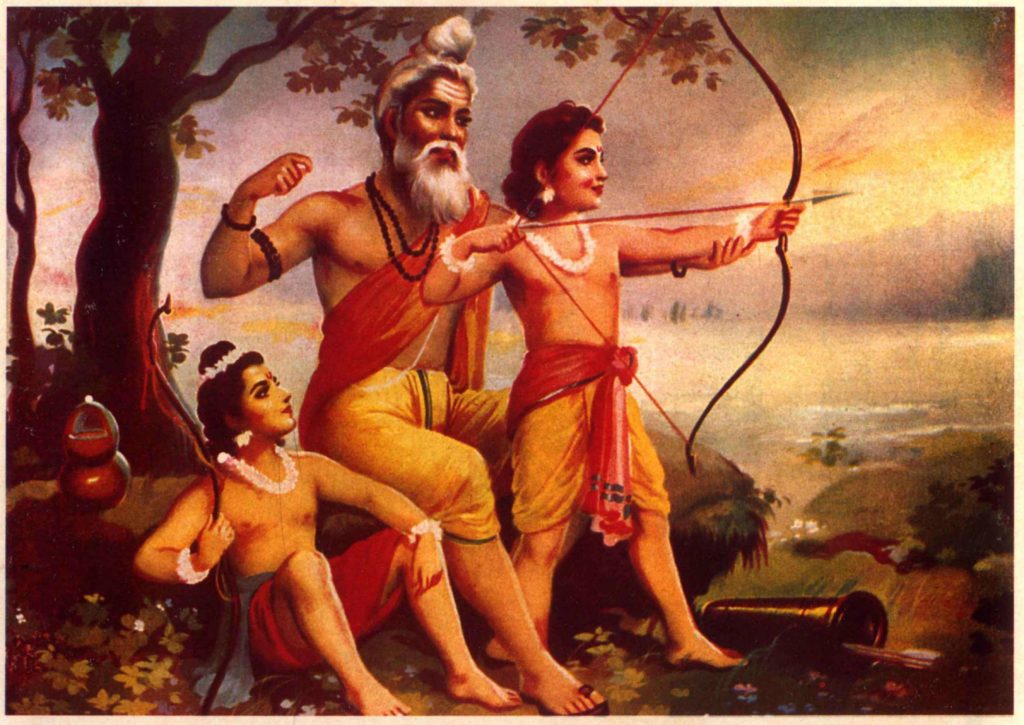Ramayana is the greatest of epic writings the world has ever seen, written by Valmiki Maharshi in Sanskrit, read by everybody in some form or part of it again and again in our country. In the original book, Valmiki Maharshi initially, exhibits the main character, Rama as an ordinary king deprived of his throne or non-crowned. Driven out of palace and went to forest. Wife accompanied him but she is abducted by Demon Ravana. Rama bound to help Sugriva, the brother of Vali, the king of monkeys. Then the story reverses gradually since most of the actions executed by Rama establishes in the hearts of the readers, a sense of honor on him.

It is said that, the Saptharishis selected ‘Ma’ from Namah Shivaya and ‘Ra’ from Om Namo Narayanaya, and thus formed the word ‘Rama’ and instructed it to Prachetas, or none other than Valmiki. Valmiki Maharshi is depicted as a great sage, or as a great poet, or as a great humanist and his humanistic narrations are seen in his verses, a few previously narrated in the chapter of Sampati.
Valmiki Maharshi has looked after queen Sita, who was sent again in exile. He brought up her two children, Lava and Kusha and educated them. One day, Narada Maharshi visited his Ashram. He treated him as a guest with reverence. Narada Maharshi used to travel anywhere and everywhere and gave Valmiki Maharshi the right picture of Rama as his contemporary king of possessing all the virtues, modesty, ability and all other qualities that an incarnation of God should have possessed.
The following lines are appearing as 13th and 14th verses of 99th Chapter, called sarga, of the 7th canto (volume) of Ramayana.
काले वर्षति पर्जन्यः सुभिक्षं विमला दिशः । हृष्ट पुष्ट जनाकीर्णं पुरं जनपदस्तथा ॥ नाकाले म्रियते कश्चिन्न व्याधिः प्राणिनां तथा । नाऽनर्थो विद्यते कस्चिद्रामे राज्यं प्रशासति ॥
The above verses are sung by Lava and Kusha as duet, the children of Rama, after the completion of Ashwamedha yaga by Shree Rama in Ayodhya. The meaning of the above verses is as follows.
The rain is showering in correct time in the empire of Shree Rama and the land is fertile, neat in all directions and wealthy. In the rural or in city areas, people are in possession of good health. There is no premature death, normally, say, not before hundred years, no illness at all, not even in animals. No incidences happen to anybody causing loss of wealth. Thus, administration of Shree Rama is appreciated.
Valmiki Maharshi has written Ramayana in seven cantos. These are
- Bala kanda
- Ayodhya kanda
- Aranya kanda
- Kishkinda kanda
- Sundara kanda
- Yuddha kanda
- Uttara kanda.
Canto and kanda are having same meaning. Further, each kanda are sub divided into small chapters called Sargas. It is said that, in the seventh kanda of original Valmiki Ramayana, there were only one hundred Sargas but now it has more Sargas. In one version, it is found containing one hundred and eleven Sargas. In total, in the whole of Ramayana, Valmiki Maharshi has written twenty four thousand verses.
The poetic or aesthetic zeal of Ramayana is of very high standard but the language of Sanskrit words is very simple. The Demons, like Surpanakha, Ravana are explained fiercely and Anusuya, Kausalya are narrated in very pleasing words. As an ordinary man may have enmity with his brother for unknown reasons, Bharata coming to cross River Ganga was initially doubted as same by Guha or Bharadwaja and these explanations are beautifully written by Valmiki Maharshi.
His humanity is more elaborated through the main character Rama during the final blessing of Vali Moksha. For the Karma of people, Rama provides the results as per the sin or virtues that are fit for experiencing.
Vasishta Maharshi sends a messenger to invite Bharata to Ayodhya after the sudden demise of his father. The Maharshi instructs the messenger to carry fruits, gifts and dresses during visiting Bharata but not to reveal of the exile of Rama or the death of his father even though it is the truth. Vasista Maharshi arranged a painted picture of his father, late Dasharatha, and put it in the gallery along with other ancestors who are no more, so that, on his coming back, he may realize the bitter truth himself. Bharata, after coming to Ayodhya and seeing the photo, understood the demise of his father, became unconscious and later recovered by treatment of Vasishta Maharshi. Later, Bharata got the news of exile of his brother Rama also. Bharata abuses his mother with harsh words which shows the vocabulary capacity of Valmiki Maharshi.
King Rama is highly respected by everybody for his generosity. He instructed his brother Lakshmana to reside with his family, in the palace of Lakshmanavati (may be the present Lucknow city) after constructing a palace there with beautiful garden, having many plants blossoming beautiful flowers and various trees bearing good fruits. The two Children of Bharata also were provided two separate palaces arranged by Bharata, being one for each at Pushkalavathy and Takshashila respectively. The younger son Lava has been accommodated at Lavapura (may be the present Lahore city).The youngest brother Shatrughna had to fight a war with a demon at Mathura and after victory over it, occupied the same city. He built a good palace in Mathura later and started ruling that area with his wife and children. Later, prince Kusha inherited Ayodhya and was crowned there.
Thus, in brief, Ramayana as a story consists more than sixty four characters and mentioned there are more than twenty four names of places. The social life was most comfortable under the ruling of Rama and by the works of Valmiki Maharshi, we are lucky to read about him.
Stories from Ramayana, especially of God Shree Rama, would appear in this website on coming days. To browse stories of God Shree Rama, simply type Rama in the search bar of gomangala.com as above and click the lens icon.
Readers may feel free to post any questions on anything. This article being a good message of hope may be forwarded to anybody.

0 Comments
1 Pingback